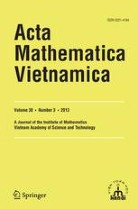
Acta Mathematica Vietnamica
- Volume 50
- Volume 49
- Volume 48
- Volume 47
- Volume 46
- Volume 45
- Volume 44
- Volume 43
- Volume 42
- Volume 41
- Volume 40
- Volume 39
- Volume 38
- Volume 37
- Volume 36
- Volume 35
- Volume 34
- Volume 33
- Volume 32
- Volume 31
- Volume 30
- Volume 29
- Volume 28
- Volume 27
- Volume 26
- Volume 25
- Volume 24
- Volume 23
- Volume 22
- Volume 21
- Volume 20
- Volume 19
- Volume 18
- Volume 17
- Volume 16
- Volume 15
- Volume 14
- Volume 13
- Volume 12
- Volume 11
- Volume 10
- Volume 9
- Volume 8
- Volume 7
- Volume 6
- Volume 5
- Volume 4
- Volume 3
- Volume 2
- Volume 1
Mean Oscillation Gradient Estimates for Elliptic Systems in Divergence Form with VMO Coefficients
Luc Nguyen
Abstract
We consider gradient estimates for $H^1$ solutions of linear elliptic systems in divergence form $\partial _{\alpha }(A_{ij}^{\alpha \beta } \partial _{\beta } u^{j}) = 0$. It is known that the Dini continuity of coefficient matrix $A = (A_{ij}^{\alpha \beta })$ is essential for the differentiability of solutions. We prove the following results:
(a) If A satisfies a condition slightly weaker than Dini continuity but stronger than belonging to VMO, namely that the $L^2$ mean oscillation $\omega_{A,a}$ of A satisfies
$$ X_{A,2} := \limsup\limits_{r\rightarrow 0} r {{\int \limits }_{r}^{2}} \frac {\omega _{A,2}(t)}{t^{2}} \exp \left (C_{*} {{\int \limits }_{t}^{R}} \frac {\omega _{A,2}(s)}{s} ds\right ) dt < \infty , $$
where $C_*$ is a positive constant depending only on the dimensions and the ellipticity, then ∇u ∈ BMO.
(b) If $X_{A,2}$ = 0, then ∇u ∈ V MO.
(c) Finally, examples satisfying $X_{A,2}$ = 0 are given showing that it is not possible to prove the boundedness of ∇u in statement (b), nor the continuity of ∇u when $\nabla u \in L^{\infty } \cap VMO$.


